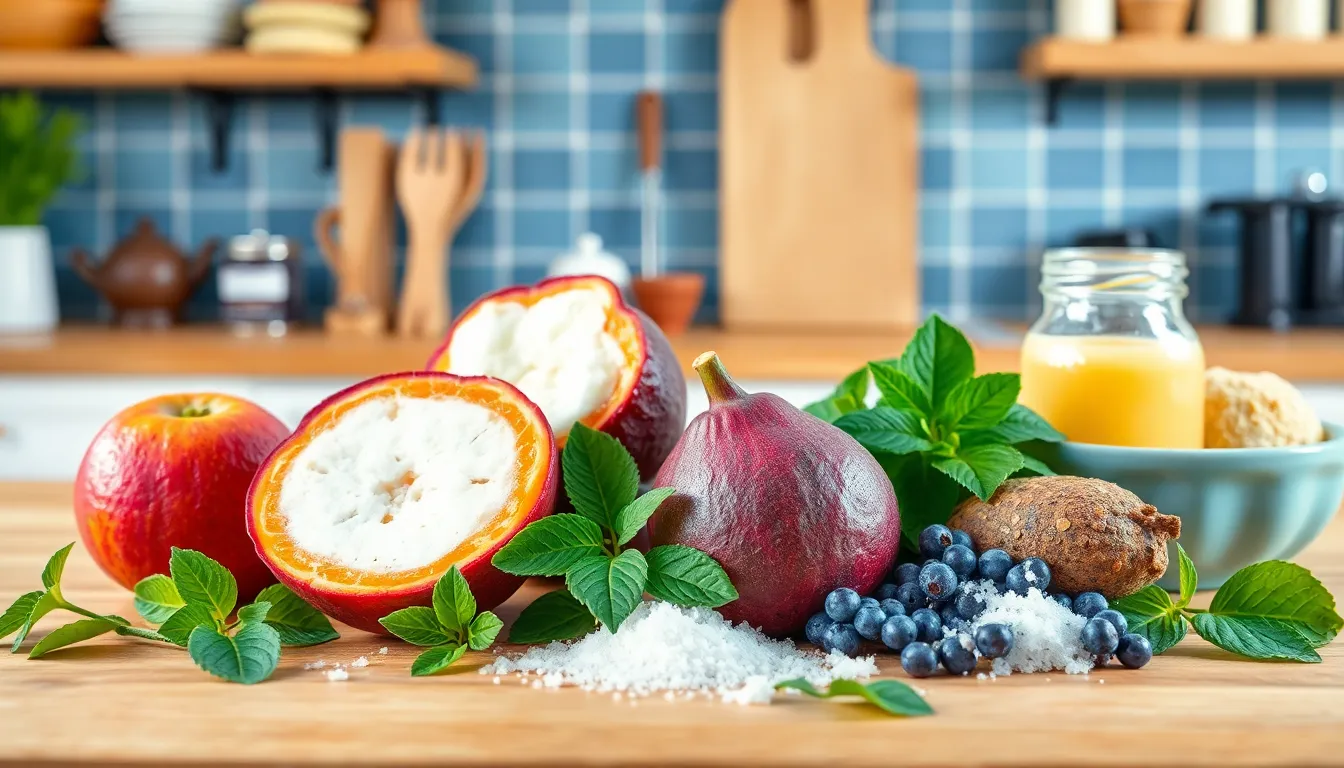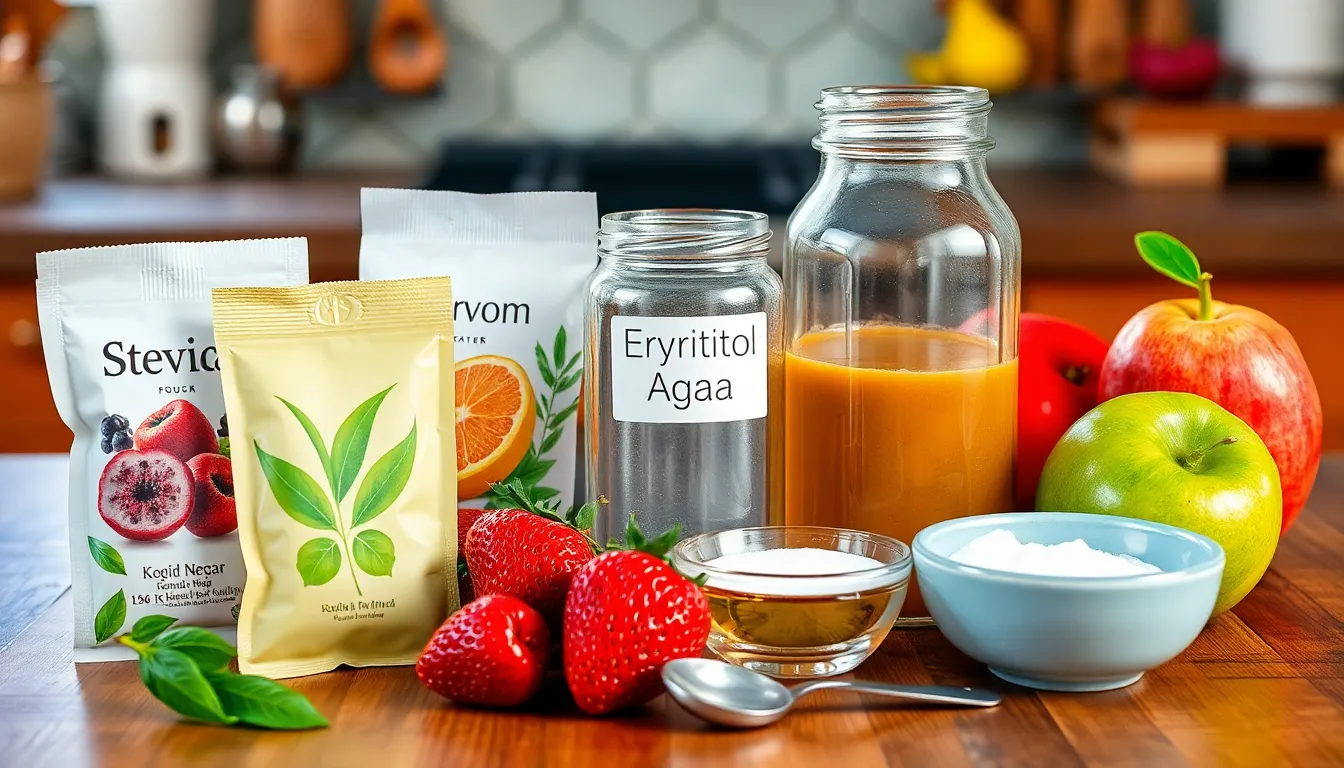In a world where sugar reigns supreme, many are looking for a sweet escape without the guilt. Enter sugar substitutes, the unsung heroes of the culinary universe. These delightful alternatives promise to satisfy those sweet cravings while keeping waistlines in check. Who knew that ditching sugar could taste so good?
Table of Contents
ToggleOverview of Sugar Substitutes
Sugar substitutes provide a range of alternatives to traditional sugar, appealing to those seeking healthier options. These substitutes can significantly reduce calorie intake while still offering sweetness. Common types include artificial sweeteners, natural sweeteners, and sugar alcohols.
Artificial sweeteners, like aspartame and sucralose, offer sweetness without calories. Brands like Equal and Splenda are popular examples. They maintain flavor without affecting blood sugar levels.
Natural sweeteners encompass options such as stevia and monk fruit. Derived from plants, these sweeteners contain minimal calories and are often perceived as healthier. Stevia, for instance, is up to 200 times sweeter than sugar but comes with zero calories.
Sugar alcohols, including erythritol and xylitol, provide sweetness with fewer calories than sugar. They typically contain about 2 calories per gram compared to 4 calories per gram in sugar. Such sweeteners can also promote dental health, as seen with xylitol.
Usage of sugar substitutes can offer versatility in various recipes. Many people find that they can use these alternatives in baking, cooking, and even beverages without sacrificing taste. While some individuals may have side effects from certain sweeteners, moderation often resolves this.
Choosing a sugar substitute depends on personal preferences and dietary goals. It’s essential to pay attention to ingredient labels, especially for individuals with specific health conditions. Understanding different types of sugar substitutes supports healthier eating habits while satisfying sweet cravings.
Types of Sugar Substitutes

Sugar substitutes come in various forms, primarily categorized into natural and artificial options. Each type offers unique benefits and flavors for different dietary needs.
Natural Sugar Substitutes
Natural sugar substitutes include options like stevia, monk fruit, and agave nectar. Stevia, derived from the leaves of the Stevia rebaudiana plant, offers sweetness without calories. Monk fruit provides a zero-calorie alternative with a sweetness that doesn’t spike blood sugar levels. Agave nectar is sweeter than sugar, allowing for lesser quantities in recipes. These substitutes integrate well into cooking and baking while retaining a sweet taste, benefiting those looking to reduce sugar intake.
Artificial Sugar Substitutes
Artificial sugar substitutes feature ingredients such as aspartame, sucralose, and saccharin. Aspartame contains zero calories and is commonly found in diet beverages and sugar-free products. Sucralose, about 600 times sweeter than sugar, withstands heat, making it suitable for baking. Saccharin, one of the oldest artificial sweeteners, adds sweetness without calories. These substitutes provide options for those wanting to limit sugar intake without losing sweetness, though they may cause reactions in some individuals.
Health Benefits of Sugar Substitutes
Sugar substitutes offer several health benefits, appealing to those looking to enhance their diets. These alternatives provide sweet flavors without the high-calorie content of traditional sugar.
Weight Management
Weight management becomes easier with sugar substitutes. Many of these alternatives contain few or no calories, making them ideal for individuals aiming to reduce overall caloric intake. Research indicates that using products like stevia or erythritol can help control cravings. Maintaining a lower calorie diet supports weight loss goals without sacrificing sweetness. Many people find that incorporating sugar substitutes into their meals keeps their taste buds satisfied while managing their weight effectively.
Blood Sugar Control
Blood sugar control significantly improves when individuals use sugar substitutes. Foods containing these sweeteners have a minimal impact on blood glucose levels, helping those with diabetes manage their condition. Stevia and monk fruit have received positive attention for their ability to sweeten foods without raising blood sugar. Choosing consistent substitutes supports stable energy levels throughout the day. Studies show that using these alternatives may also reduce the risk of insulin resistance over time.
Potential Risks and Side Effects
Sugar substitutes may offer various benefits, but potential risks and side effects exist. Understanding these concerns can help individuals make informed choices.
Digestive Issues
Some sugar substitutes, particularly sugar alcohols like erythritol and xylitol, can lead to digestive discomfort. Gas, bloating, and diarrhea appear in individuals sensitive to these ingredients. Individuals consuming amounts exceeding 50 grams may experience more severe gastrointestinal symptoms. It’s crucial to introduce these substitutes gradually to assess tolerance. Products sweetened with these alternatives may also contain other ingredients that contribute to digestive distress. Monitoring reactions helps determine which substitutes work best for individual needs.
Long-Term Health Concerns
Long-term effects of consuming artificial sweeteners remain a topic of research. Some studies suggest links between artificial sweeteners and negative health outcomes, including metabolic disorders and potential weight gain. Aspartame and sucralose may affect gut microbiota, leading to concerns over their impact on overall health. Other reports indicate potential behavioral changes in children associated with frequent consumption of these substitutes. Individuals should weigh these potential risks against the benefits when deciding on sugar substitutes. Seeking guidance from health professionals is advisable when considering long-term use.
Popular Sugar Substitutes on the Market
Various sugar substitutes offer options for those seeking alternatives to traditional sugar. Aspartame stands out among artificial sweeteners, providing a low-calorie option for beverages and foods. Sucralose, another artificial choice, remains stable during baking, making it useful for sweets that require heat.
Natural substitutes include stevia, derived from the leaves of the Stevia rebaudiana plant. This plant-based sweetener has zero calories and can enhance flavor in both beverages and desserts. Monk fruit extract, obtained from the monk fruit, features sweetness without calories and pairs well with other ingredients during baking.
Sugar alcohols like erythritol and xylitol present unique benefits. Erythritol contains about 0.24 calories per gram, which is significantly lower than table sugar. Xylitol offers a similar calorie count but also supports dental health by reducing cavity-causing bacteria.
Agave nectar, a syrup-like natural option, provides a mild sweetness and dissolves easily, making it ideal for cold drinks. Coconut sugar, made from the sap of coconut blossoms, boasts a lower glycemic index than regular sugar, appealing to those seeking a less intense impact on blood sugar levels.
Selecting the right substitute often hinges on individual tastes and dietary needs. Reading ingredient labels proves essential, especially for those with specific health conditions. Trying different substitutes can help individuals find the ideal sweetness without compromising their health goals.
Sugar substitutes offer a promising path for those seeking to reduce their sugar intake without sacrificing flavor. With a variety of options available from natural to artificial sweeteners, individuals can find alternatives that suit their dietary needs and preferences. These substitutes not only help manage weight and blood sugar levels but also provide versatility in cooking and baking.
However, it’s crucial to remain mindful of potential side effects and to choose wisely based on personal health goals. By experimenting with different sugar substitutes and consulting health professionals when necessary, individuals can enjoy the sweetness they crave while supporting their overall well-being.



